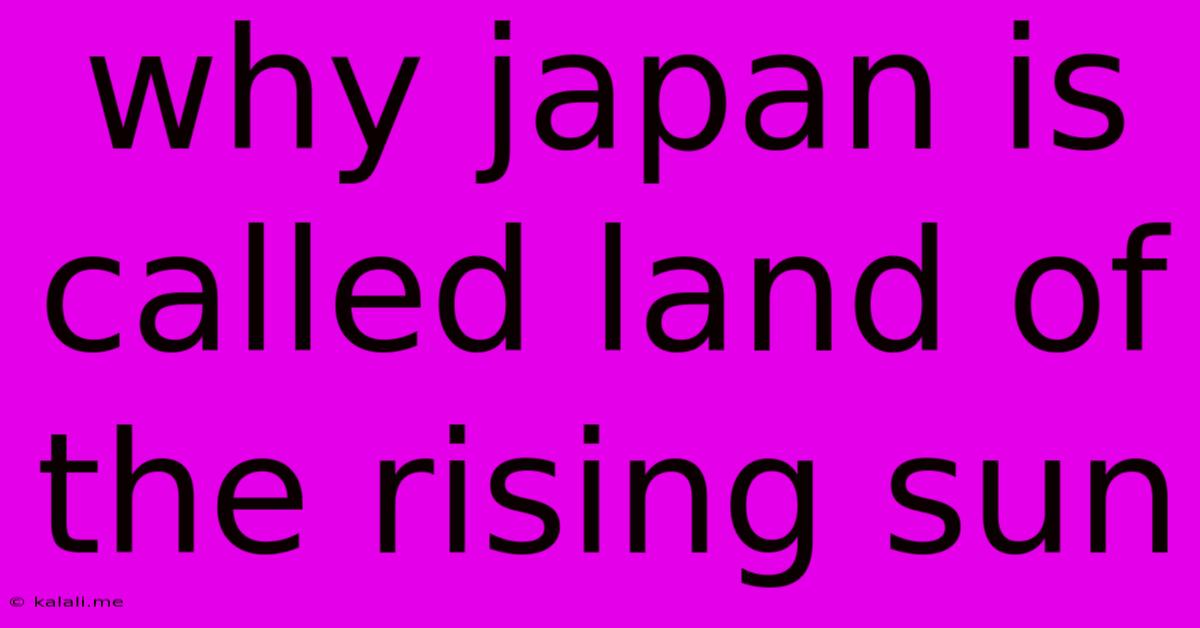Why Japan Is Called Land Of The Rising Sun
Kalali
May 21, 2025 · 3 min read

Table of Contents
Why is Japan Called the Land of the Rising Sun?
Japan, officially known as Nihon or Nippon, is often referred to as the "Land of the Rising Sun." This evocative moniker, rich in history and cultural significance, isn't merely a poetic flourish; it stems from the country's geographical location and the ancient perspective of its people. Understanding its origin reveals fascinating insights into Japanese history and worldview.
The simple answer lies in Japan's geographical position. Located on the eastern edge of the Asian continent, Japan is one of the first places on Earth to greet the sun each day. As the sun rises over the Pacific Ocean, its golden rays illuminate the Japanese archipelago first, creating a spectacular sunrise visible across the country. This daily spectacle deeply influenced the ancient Japanese identity and perceptions of the world.
Ancient Perceptions and National Identity
The term "Land of the Rising Sun" doesn't have a single, definitive origin story. It evolved over centuries, shaped by historical context and cultural interpretations. While the precise phrasing might not have been used consistently in ancient times, the concept certainly existed. Early Japanese literature and imperial pronouncements often reflected this geographical reality.
The image of the rising sun became intimately tied to the imperial court and the concept of the emperor's divine authority. The sun, a potent symbol of power and life, was directly associated with the emperor's reign, solidifying the nation's identity and bolstering its national pride. This symbolic connection profoundly shaped Japanese culture, influencing everything from art and literature to political ideology and nationalistic sentiment.
The Sun in Japanese Culture and Mythology
The sun holds a central place within Japanese mythology and culture. The sun goddess Amaterasu is a key figure in Shinto, the indigenous religion of Japan. Amaterasu is considered the ancestor of the imperial family, further reinforcing the link between the sun, the emperor, and the nation. Her mythical significance underscored the importance of the rising sun within Japanese identity.
Depictions of the sun are frequently seen in Japanese art, architecture, and other cultural artifacts. The Hinomaru, Japan's national flag, features a red sun disc on a white background, a direct visual representation of this national symbol. This enduring imagery continues to serve as a powerful reminder of the country's unique geographical location and its historical ties to the sun.
Modern Usage and International Recognition
The term "Land of the Rising Sun" has transcended its historical origins and become a widely recognized and accepted international appellation for Japan. While the term's symbolic weight might be more readily grasped by those familiar with Japanese history and culture, it remains a fitting and evocative description of a nation that greets the new day first. Its enduring popularity speaks to the powerful imagery of the sunrise and its deep-seated connection to the Japanese national identity. The term continues to be used globally to refer to Japan, signifying both its geographical position and the rich cultural significance of the rising sun.
In conclusion, the moniker "Land of the Rising Sun" is far more than just a picturesque description of Japan. It's a deeply rooted cultural symbol, reflecting the nation's geography, mythology, and imperial history. The daily spectacle of the rising sun, coupled with its profound cultural significance, has cemented this evocative name into the global consciousness.
Latest Posts
Latest Posts
-
How To Clean Dried Grout Off Tile
May 21, 2025
-
Wiring 2 Way 2 Gang Switch
May 21, 2025
-
How Old Was Samson When He Died
May 21, 2025
-
How Do Tv Series Make Money
May 21, 2025
-
Usb A To Usb A Cable
May 21, 2025
Related Post
Thank you for visiting our website which covers about Why Japan Is Called Land Of The Rising Sun . We hope the information provided has been useful to you. Feel free to contact us if you have any questions or need further assistance. See you next time and don't miss to bookmark.